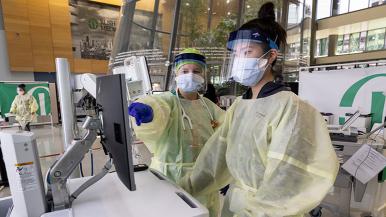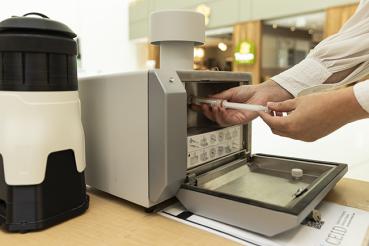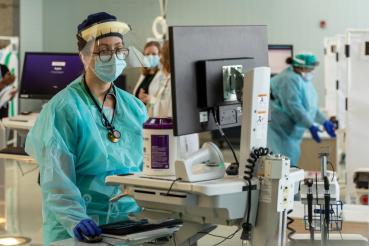As the state of Illinois feels the strain of the omicron surge, RUSH continues to meet the needs of COVID-19 patients while providing essential patient care for those with non-COVID health issues.
“In December of 2020 when the Chicago Tribune described the signature tower of RUSH University Medical Center as ‘the pandemic-ready RUSH Hospital (that) raised our sights and spirits,’ COVID-19 vaccines were just a few weeks away, and some felt the pandemic might be winding down,” said Dr. Omar Lateef, president and CEO of Rush University Medical Center.
“Now more than a year later, we again have a resilient team across RUSH still fighting on the front lines as the omicron variant surges and we experience another peak in COVID transmission across the Chicago area. Each day they demonstrate through their unwavering commitment that RUSH was built for this, and we are still here for you.”
Like every health system, RUSH is closely monitoring capacity and doing everything possible to ensure patients’ needs are met.
“RUSH is fortunate in that we have incredibly flexible facilities that allow us to adjust operations based on need in real time,” Lateef said. “We have been pulling some of those levers already and will scale up as needed to meet the needs of all our patients.”
Several steps have been taken to increase hospital capacity and access during this time of need. These include the following:
- Rush University Medical Center’s main hospital lobby — the Edward A. Brennan Entry Pavilion — has again been converted to care for patients being seen in our emergency department.
- Housing some 16 patient bays and overflow waiting for the Rush University Medical Center emergency department, the Tower’s flexibility is an essential part of providing safe care to all of our patients.
- RUSH has continued to expand care delivered virtually so patients can connect with a clinician for a wide array of medical conditions without leaving home or risking exposure in the outside world.
- Across RUSH, some “elective procedures” — defined as not medically essential or time-sensitive in preventing loss of life, limb or critical function — have been postponed, opening staffed beds for those in need of critical COVID-19 care.
- Physicians are working with patients to assess the medical necessity of scheduled procedures and postponing those that can be without impacting long-term health.
- In partnership with the Chicago Department of Public Health, Connect Chicago — the citywide community testing program — continues to be a significant resource for those in need of COVID-19 testing.
- Community vaccination efforts continue with RUSH University Medical Center staff providing care in several of the city of Chicago’s shelters and places where access to care is a challenge.
- RUSH University Medical Center is performing staff testing on a walk-in basis to ensure employees can have up-to-the-minute information on their COVID-19 status and be eligible to return to work as soon as medically able.
- New bed availability for COVID-19 patients has been added at Rush University Medical Center, Rush Oak Park Hospital and Rush Copley Medical Center in anticipation of the continued surge.
In addition to the operational updates described above, each day a RUSH team performs a review of surgical cases scheduled for the next day across the system to evaluate each procedure for medical necessity.
“Medically necessary procedures” include surgical and interventional procedures. Research demonstrates that postponing such procedures for patients could potentially lead to increased morbidities and has been shown to increase anxiety among patients.
“It’s critically important that patients don’t delay care that they need. It’s safe to go to the hospital,” said Dr. Paul Casey, chief medical officer at Rush University Medical Center. “It’s safe to go to RUSH. But delaying care is not safe. The data during the pandemic and our clinical experience at RUSH has borne that out. Our physicians saw delayed care for heart attacks and strokes, more aggressive cancers, and the sequelae of delayed care in those who waited to see their doctor. Illness comes in many forms, and individuals need to continue preventive health and disease management to prevent these unnecessary complications of delayed care.”
“Ultimately, staffing is one of the biggest challenges for hospitals across the country, and RUSH is no exception,” said Angelique Richard, senior vice president for hospital operations and chief nursing officer at Rush University Medical Center. “Without staff, our facilities and expertise cannot be used to their fullest potential. We are aggressively working to retain our valued staff, recruiting, training and hiring across the organization to ensure our staffing levels remain strong. Protecting our incredible health care team is essential to effectively fight the virus and maintain our commitment to caring for our community.”
“Do your part. Please get vaccinated for COVID-19 and the flu and get your COVID booster,” Richard added. “Encourage your family and friends to get vaccinated and boosted. And until the day when COVID is safely behind us, please continue to practice masking, social distancing and proper handwashing.”




